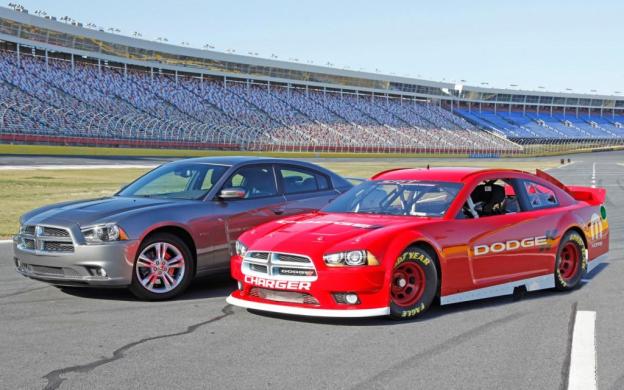 With their old-fashioned pushrod V8s (which adopted fuel-injection this year) and cookie-cutter bodies, NASCAR racers are not on the cutting edge of technology. However, the sport has been at the center of American performance since bootleggers started throwing their Ford V8s around oval tracks in the 1950s. That’s why Dodge’s decision to withdraw from NASCAR at the end of 2012 is unprecedented: for the first time, one of the Big Three will not be represented there.
With their old-fashioned pushrod V8s (which adopted fuel-injection this year) and cookie-cutter bodies, NASCAR racers are not on the cutting edge of technology. However, the sport has been at the center of American performance since bootleggers started throwing their Ford V8s around oval tracks in the 1950s. That’s why Dodge’s decision to withdraw from NASCAR at the end of 2012 is unprecedented: for the first time, one of the Big Three will not be represented there.
The announcement comes after Penske Racing, the only team fielding Dodge cars, said it would switch to Ford in 2013. Despite working on a new car based on the current Charger, Dodge was not eager to chase after new teams.
“This issue came about many years ago when we consolidated down to one team,” said Ralph Gilles, CEO of Chrysler’s SRT performance brand. “We had one-stop shopping with Penske, but what’s available in North Carolina isn’t what was available 5-10 years ago. I’m not undermining the caliber of those who came to talk to us, but it’s not as easy to configure a team at a level we’re used to. But we don’t just want to show up; we want to race to win.”
Gilles said the issue was Dodge’s inability to land another top-tier team like Penske; it has nothing to do with financial concerns. Dodge recently tripled its NASCAR budget, and engineers were working on the 2013 Charger stock car just days before Gilles decided to pull the plug.
Dodge will move on to other forms of motor sport where it will be more visible, and hopefully wrack up a few more trophies. A racing version of the 2013 SRT Viper, the Viper GTS-R is being campaigned in the American Le Mans Series (ALMS); it took tenth place in-class in its first race at Mid-Ohio.
Dodge is also racing a Dart in the Global RallyCross Championship. That should put the spotlight on a very important car for Chrysler’s mainstream brand. Dodge needs the Dart to prove that it can make a quality compact car, and that its partnership with Fiat is working out.
Breaking a tradition is hard, but ALMS and Global RallyCross might be better ways to translate racing success into showroom traffic. Although NASCAR has the words “stock car” in its name, the cars have almost nothing in common with their street-legal namesakes. The headlights are decals, after all. The racing Dart and Viper at least start out with stock chassis, so it will be easier for consumers to relate to them.
Legions of NASCAR fans will probably howl in protest the same way they did when Toyota fielded its first Camry stock car. This all-American motor sport is starting to reflect the car industry itself: nothing is sacred.


